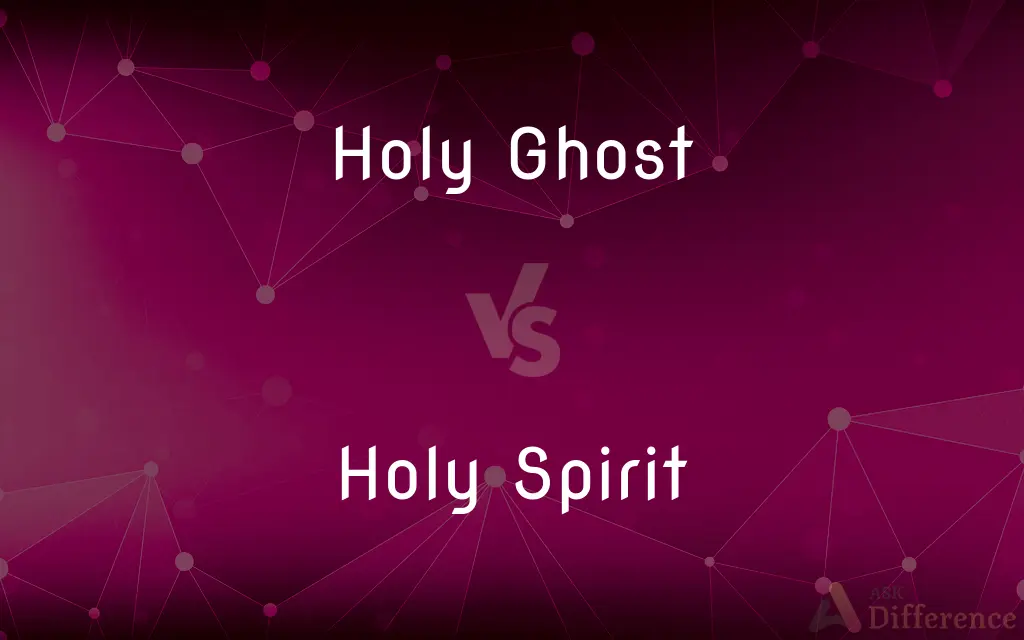Holy Ghost vs. Holy Spirit — What's the Difference?
By Maham Liaqat & Fiza Rafique — Published on November 3, 2024
"Holy Ghost" and "Holy Spirit" refer to the same entity in Christian theology, the third person of the Trinity, but "Holy Spirit" is the more modern term preferred in contemporary usage.

Difference Between Holy Ghost and Holy Spirit
Table of Contents
ADVERTISEMENT
Key Differences
Historically, "Holy Ghost" was the term predominantly used in Christian contexts to refer to the third person of the Holy Trinity, comprising the Father, the Son, and the Holy Ghost. This term was especially prevalent in earlier English translations of the Bible, such as the King James Version. Over time, "Holy Spirit" has become the more commonly used term, reflecting a shift in linguistic preferences and theological nuances. The evolution from "Holy Ghost" to "Holy Spirit" mirrors changes in modern English usage and theological discourse.
The use of "Holy Ghost" in older English versions of the Bible and religious literature conveyed the same theological concept as "Holy Spirit" does today: the presence of God that is active in the world, guiding and sanctifying believers. The term "Ghost," in its older English usage, was synonymous with "spirit," both referring to the immaterial and invisible essence of God's presence.
In contemporary discussions and translations of Christian texts, "Holy Spirit" is preferred for several reasons. The word "Spirit" is thought to better capture the essence and work of the third person of the Trinity, emphasizing the life-giving and dynamic presence of God.
The transition from "Holy Ghost" to "Holy Spirit" in theological language does not signify a change in doctrine but rather reflects a linguistic and cultural update to maintain clarity and relevance in worship and theological education. Both terms are considered theologically correct, and the choice between them often depends on tradition, denomination, and personal or communal preference.
Despite the shift in terminology, the core beliefs about the Holy Spirit remain constant across Christian denominations: the Holy Spirit is the comforter, advocate, and guide for believers, involved in creation, inspiration, and the sanctification of individuals. The Holy Spirit's role in Christian life and doctrine underscores the unity and diversity within the Trinity, affirming the belief in one God in three persons.
ADVERTISEMENT
Comparison Chart
Terminology
Traditional term used in Christianity
Modern term preferred in contemporary use
Linguistic Origin
Old English usage
Modern English usage
Biblical Usage
Prominent in older translations (e.g., KJV)
Prominent in newer translations
Theological Meaning
Same as Holy Spirit
Same as Holy Ghost
Cultural Connotations
May imply a connection to spirits of the dead in modern context
Free from modern ghostly associations
Preference
Favored in certain traditions and older literature
Widely accepted in contemporary theology and worship
Role in Trinity
Third person of the Trinity
Third person of the Trinity
Function
Comforter, advocate, guide
Comforter, advocate, guide
Denominational Usage
More common in traditional or conservative settings
Preferred across a wide range of denominations
Compare with Definitions
Holy Ghost
Associated with spiritual gifts and guidance.
The Holy Ghost bestows wisdom and understanding.
Holy Spirit
The modern term for the third person of the Trinity in Christianity.
The Holy Spirit is celebrated at Pentecost, marking the birth of the Church.
Holy Ghost
Seen in older English translations of the Bible.
The term Holy Ghost is frequently used in the King James Version.
Holy Spirit
Imparts spiritual fruits and gifts.
Love, joy, and peace are fruits of the Holy Spirit.
Holy Ghost
Represents God's presence in the world.
Believers are guided by the Holy Ghost in their daily lives.
Holy Spirit
Central to contemporary Christian worship and prayer.
Prayers for guidance often call upon the Holy Spirit.
Holy Ghost
Traditional term for the third person of the Christian Trinity.
The Holy Ghost descended upon the apostles at Pentecost.
Holy Spirit
Featured in modern Bible translations.
Newer translations prefer Holy Spirit for clarity and relevance.
Holy Ghost
Invoked in traditional liturgy and hymns.
The doxology often ends with a praise to the Father, Son, and Holy Ghost.
Holy Spirit
Symbolizes God's power and presence.
The Holy Spirit empowers believers to live according to God's will.
Common Curiosities
Why has "Holy Spirit" become more popular than "Holy Ghost"?
"Holy Spirit" is preferred in contemporary usage because it avoids the modern connotations of "ghost" and better reflects the essence of God's spirit.
Can "Holy Ghost" still be used in worship and prayer?
Yes, "Holy Ghost" can still be used, especially in traditions or denominations that favor historical liturgy and translations.
Is there a difference between the Holy Ghost and the Holy Spirit?
No, "Holy Ghost" and "Holy Spirit" refer to the same entity in Christian theology; the difference is purely linguistic.
Does the shift from "Holy Ghost" to "Holy Spirit" affect Christian doctrine?
No, the shift in terminology does not signify a doctrinal change but reflects linguistic and cultural adaptations to maintain clarity in faith expression.
Do all Christian denominations use "Holy Spirit"?
While "Holy Spirit" is widely accepted, some denominations or individual preferences may still favor the use of "Holy Ghost" based on tradition.
How do I receive the Holy Spirit?
According to Christian teaching, the Holy Spirit is received by faith in Jesus Christ, often associated with baptism, prayer, and laying on of hands in some traditions.
What does the Holy Spirit do in Christianity?
The Holy Spirit plays several roles including guiding, comforting, and convicting believers, empowering them for service, and imparting spiritual gifts.
How is the Holy Spirit depicted in the Bible?
The Holy Spirit is depicted in various ways in the Bible, including as a dove at Jesus' baptism, wind and fire at Pentecost, and through symbols such as water, oil, and a seal.
Why do some prayers and hymns still use "Holy Ghost"?
Some prayers and hymns retain "Holy Ghost" due to their historical origins and the poetic or traditional language that resonates with certain faith communities.
Can someone feel the Holy Spirit?
Many Christians report experiencing the presence of the Holy Spirit through inner peace, comfort during difficult times, conviction, or guidance.
Is the Holy Spirit equal to the Father and the Son?
Yes, in Christian doctrine, the Holy Spirit is equal to the Father and the Son, all three persons being distinct yet of one essence in the Trinity.
Do all Christians agree on the role of the Holy Spirit?
While the basic understanding of the Holy Spirit is shared, there are variations in how different denominations and traditions emphasize and understand the Spirit's role and gifts.
What is the fruit of the Holy Spirit?
The fruit of the Holy Spirit, as described in Galatians 5:22-23, includes love, joy, peace, patience, kindness, goodness, faithfulness, gentleness, and self-control, evidencing a life transformed by the Spirit.
Is the term "Holy Ghost" outdated?
While considered traditional, "Holy Ghost" is not outdated but is less commonly used in modern language, with "Holy Spirit" being the preferred term in contemporary contexts.
How does the Holy Spirit help in understanding the Bible?
The Holy Spirit is believed to enlighten and guide believers, helping them to understand and apply the scriptures in their lives.
What is blasphemy against the Holy Spirit?
Blasphemy against the Holy Spirit, referred to in the Bible as an unforgivable sin, is traditionally understood as the persistent and willful rejection of God's grace and forgiveness.
What is the significance of Pentecost in relation to the Holy Spirit?
Pentecost is significant as it marks the descent of the Holy Spirit upon the apostles, empowering them to preach the gospel, and is considered the birth of the Christian Church.
Does the Holy Spirit reside in everyone?
Christian doctrine teaches that the Holy Spirit dwells within those who have accepted Christ as their Savior, marking them as God's children.
What are the gifts of the Holy Spirit?
The gifts of the Holy Spirit include wisdom, understanding, counsel, fortitude, knowledge, piety, and fear of the Lord, along with additional gifts like prophecy, healing, and speaking in tongues.
How is the Holy Spirit involved in prayer?
The Holy Spirit intercedes for believers, often helping them pray when they are unable to express their needs and desires, according to Romans 8:26-27.
Share Your Discovery

Previous Comparison
Microsoft Excel vs. Google Sheets
Next Comparison
Mutualism vs. ProtocooperationAuthor Spotlight
Written by
Maham LiaqatCo-written by
Fiza RafiqueFiza Rafique is a skilled content writer at AskDifference.com, where she meticulously refines and enhances written pieces. Drawing from her vast editorial expertise, Fiza ensures clarity, accuracy, and precision in every article. Passionate about language, she continually seeks to elevate the quality of content for readers worldwide.














































